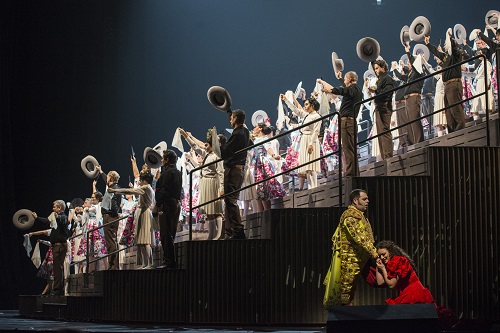 Germany Bizet, Carmen: Soloists, Children’s Chorus (chorus director: Christian Lindhorst) and Chorus (chorus director: Jeremy Bines) of the Deutsche Oper, Orchestra of the Deutsche Oper / Ben Glassberg (conductor). Deutsche Oper, Berlin, 26.10.2023. (MB)
Germany Bizet, Carmen: Soloists, Children’s Chorus (chorus director: Christian Lindhorst) and Chorus (chorus director: Jeremy Bines) of the Deutsche Oper, Orchestra of the Deutsche Oper / Ben Glassberg (conductor). Deutsche Oper, Berlin, 26.10.2023. (MB)

Production:
Director – Ole Anders Tandberg
Set designs – Erlend Birkeland
Costumes – Maria Geber
Lighting – Ellen Ruge
Choreography – Silke Sense
Cast:
Carmen – Aigul Akhmetshina
Don José – David Butt Philip
Micaëla – Maria Motolygina
Escamillo – Byung Gil Kim
Zuniga – Christian Simmons
Moralès – Dean Murphy
Frasquita – Meechot Marrero
Mercédès – Arianna Manganello
Dancaïro – Artur Garbas
Remendado – Kieran Carrel
Lillas Pastia – Dean Street
Mercédès’s daughter – Fatima Hammad
Hmmm. I think I could see, some of the time, what Ole Anders Tandberg was trying to do in his 2018 Deutsche Oper production of Carmen. There were some reasonable ideas, some less so, and some that were frankly terrible. Next to Dmitri Tcherniakov’s brilliant reimagining of the work for Aix in 2017 (review here), though, this did not really pass muster. If you like gruesome imagery with unfortunate (I assume they were accidental) racist overtones, this may be for you. If not, even something more ’traditional’ is likely to prove a better bet than this.
The curtain confronting us on entrance to the theatre, sets the tone: a bloody scene, involving what must have been the gouged eye of a bull. Once the curtain rises, the bullring (Iberia, not Birmingham) is centre stage, and proves to be the only setting for the entire thing: either inside, the arena suggestive of an amphitheatre, or outside (as one would expect for the fourth act). Fair enough, except nothing really is done with this. The metatheatrical suggestion turns out to have nothing to it. And whilst we know Carmen involves bullfighting, is it really ‘about’ it? It could be, I suppose, but there is little sign of that here, other than a strange obsession with internal organs (and even that is pushing an association).
Violence, one might say, is a central theme, though nowadays we tend to tread a little more carefully when it comes to that perpetrated by men on women. Micaëla is sexually assaulted by the soldiers when she arrives, which makes her embarrassing octopus-like approach to Don José at best unfortunate. (I might suggest she was traumatised, but I do not think we go that deep.) More fundamentally, the ‘symbolic’ association of Carmen with a bull is, on a charitable reading, extremely unfortunate. Portraying the Roma community as body snatchers dealing in human organs: well, I shall leave it at that. Don José’s enthusiastic induction at the end of the second act, harvesting Zuniga’s innards I shall let speak for itself; likewise the cardless card scene in which entrails, gingerly approached with white rubber gloves, are not so much consulted as haplessly dangled.

If anything worse still, the idea of Carmen as an opéra comique is abandoned for what seems to think itself a knowing send-up of grand opéra – why, when the work is not that in the first place? – yet ends up capitulating to Meyerbeerian ‘effect without cause’ far more than it realises. Strange people, presumably symbolic of something or other, march around the stage to no particular effect. Some are in drag, others are children, others are soldiers who excitedly attempt, without success, to have sex with the stadium walls (and are promptly carried off by the bodysnatchers). Choreography, here as elsewhere, is worse than unfortunate. Tandberg’s production, then, is less ‘about’ vulgarity, ‘knowing’ trajes de gitana notwithstanding, and more plain vulgar.
Given the setting, Aigul Akhmetshina and David Butt Philip emerged with considerable dignity, the musicality and dramatic commitment of their performances impressive throughout. Akhmetshina did what she could to present a proper mixture of pride and vulnerability, in a readily communicative performance Butt Philip seems unable to put a foot wrong right now, readily conquering swathes of the tenor repertoire. I am happy to report that his French is excellent too. Would that I could say the same for Byung Gil Kim’s Escamillo, for which I was lucky to decipher one word in twenty. It was a pity, since his dark tone and stage presence showed promise; but if all one is left for the words is to read the surtitles, then much is lost. Maria Motolygina’s Micaëla was beautifully sung, despite Tandberg’s peculiar conception of the role. Indeed, so was everything else, the well-trained chorus included. My heart went out to its singers for some of the am-dram movement they were required to do: again, presumably ‘ironic’, yet hardly seeming so.
The faults of the evening lay neither in the singing nor in the pit, where Ben Glassberg conducted an incisive, colourful account of the orchestral score, considerate to singers without bowing to them, aided immensely by keen, responsive playing from the Orchestra of the Deutsche Oper. He was not helped by having to stop for all-too-numerous incidents of mid-act applause in what appeared to verge on built-in pauses onstage. I may be too Wagnerian, may Nietzsche forgive me, about this, but such monotonous regularity of indiscriminate applause does no one any good. Nor, I fear, will a barrage of coughing from all quarters, suggestive of an advanced-stage tuberculosis clinic. Surely part of a director’s job would be at least to encourage continuity of action; but then a good part of that job seemed on this occasion to have been missed. Rarely has Andalusia seemed less inviting or less interesting.
Mark Berry
